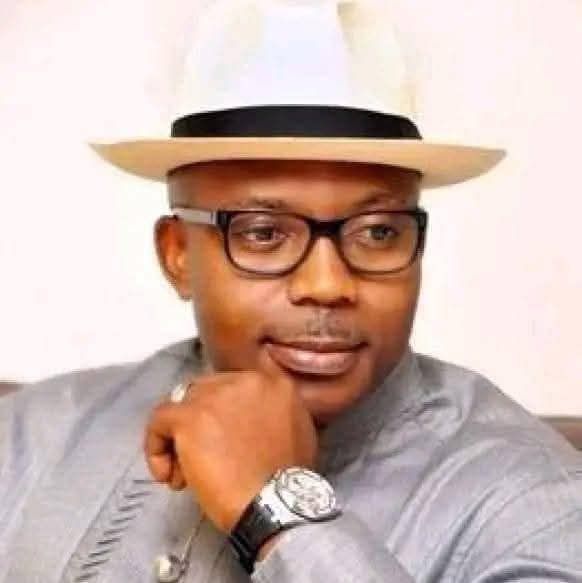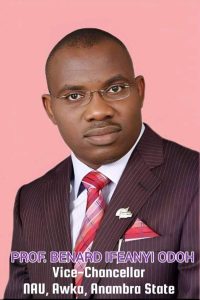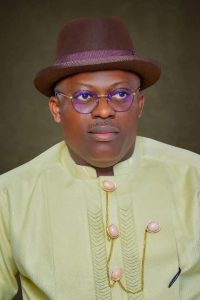Meet Nigeria’s Longest-Serving Lawmaker: Hon. Nicholas Mutu Ebomo, Representing Bomadi/Patani Since 1999 — Set to Clock 28 Years in Office by 2027
Hon. Nicholas Mutu Ebomo has been in the House of Representatives since 1999. He represents Bomadi/Patani Federal Constituency of Delta state. He was Chairman, House Committee on NDDC between 2009 and 2019.
He is Nigeria’s longest-serving legislator. He has never changed political party and has been consistently elected on the platform of the PDP.By 2027, he would have spent 28yrs as a Federal Lawmaker. His mates have gone to become Senators & Governors.
Today, Hon. Nicholas Mutu has left the PDP to join the APC.
The defection of Hon. Nicholas Mutu Ebomo from the Peoples Democratic Party (PDP) to the All Progressives Congress (APC) has sent ripples across Nigeria’s political landscape. As Nigeria’s longest-serving member of the House of Representatives, his political choices carry significant weight, especially in Delta State where he has consistently represented the Bomadi/Patani Federal Constituency since the return to democratic rule in 1999. By the next general elections in 2027, Mutu would have spent 28 uninterrupted years in the National Assembly, a record that underscores both his political resilience and the deep-rooted trust of his constituents.
This development raises critical questions: What motivated the defection? What does this mean for the PDP in Delta State and nationally? Is this simply a personal political calculation, or does it signal a broader trend in Nigerian politics? This article takes a comprehensive look at Hon. Mutu’s political journey, his achievements, controversies, and the implications of his party switch.
I. A Political Stalwart: Mutu’s Journey from 1999 to 2025
Hon. Nicholas Mutu Ebomo emerged on Nigeria’s Fourth Republic political scene in 1999, at a time when the country was transitioning from decades of military rule. As a founding member of the PDP in Delta State, he quickly built a strong base in the Bomadi/Patani Federal Constituency, a riverine region with unique socio-economic challenges.
Mutu’s political career has been marked by consistency and longevity. Elected to the House of Representatives in 1999, he won re-election in 2003, 2007, 2011, 2015, 2019, and 2023. His ability to navigate the often-turbulent waters of Nigerian politics, especially within the PDP which has faced multiple internal crises, is a testament to his political acumen.
YOU MAY READ
Delta State Governor Sheriff Oborevwori Defects from PDP to APC in Major Political Realignment
He served as Chairman of the House Committee on the Niger Delta Development Commission (NDDC) between 2009 and 2019. During this period, the committee was one of the most powerful in the National Assembly due to the strategic importance of the NDDC in the oil-rich Niger Delta region. Under his chairmanship, the committee oversaw the implementation of numerous development projects, although it was also mired in several controversies concerning contract awards and project execution.
II. The NDDC Years: Power, Controversies, and Allegations
As Chairman of the House Committee on NDDC, Mutu wielded enormous influence over budgetary appropriations and project oversight in the Niger Delta. While some laud his tenure for attracting federal projects to underserved communities, others criticize it for lacking transparency.
Mutu has been investigated multiple times by anti-corruption agencies, including the Economic and Financial Crimes Commission (EFCC), over allegations related to contract scams and misappropriation of funds within the NDDC. Despite these, no formal conviction has been recorded against him, allowing him to retain his political relevance.
Critics argue that his long tenure in the House was used more for personal and political consolidation than for progressive legislative activism. Supporters counter this claim, citing his consistency in pushing for increased federal presence in riverine areas, particularly in infrastructural development, education, and health.
III. Delta State and the PDP: A Historic Bond
Delta State has been a PDP stronghold since 1999. The party has produced all state governors, and most National Assembly members from the state, including Mutu, have been elected on the party’s platform. His defection to the APC, therefore, is particularly significant.
As a ranking member of the PDP in the state, Mutu has played a pivotal role in state and local party politics. He was instrumental in PDP’s electoral victories in Patani and Bomadi LGAs and had close alliances with former Governors James Ibori, Emmanuel Uduaghan, and Ifeanyi Okowa. His departure could signal internal rifts or dissatisfaction with the current party leadership.
Sources suggest that Mutu’s influence within the PDP had waned in recent years, especially following the emergence of new political figures from the region and the generational shift sweeping across Nigerian politics. Younger politicians are beginning to demand space, and the old guard is increasingly viewed as disconnected from grassroots realities.
IV. The APC Appeal: Strategy, Power, and Realignments
What could drive a man like Hon. Mutu, who has enjoyed two decades of PDP dominance, to suddenly switch to the APC? The answer may lie in both personal political calculations and national political realignments.
The APC currently controls the federal government under President Bola Tinubu. Mutu’s defection could be an attempt to stay politically relevant in a rapidly changing landscape. By aligning with the ruling party, he gains access to federal patronage, appointments, and influence. This is especially critical as the 2027 general elections approach.
The APC, on its part, is keen on penetrating PDP strongholds like Delta State. Mutu’s defection gives the party a strategic foothold in Bomadi/Patani and boosts its chances in the South-South. For the APC, bringing in long-serving legislators like Mutu serves as a counterweight to defections they have suffered in other regions.
YOU MAY READ
Delta Political Tsunami: Okowa, Deputy Governor, Speaker, and PDP Leaders Join APC with Governor Oborevwori
V. Political Longevity and Its Double-Edged Sword
Mutu’s 28-year record in the House of Representatives is unrivaled. While longevity in politics can be a marker of experience, stability, and institutional memory, it can also be perceived as political stagnation. In an era where voters demand change, innovation, and youth inclusion, such extended tenure invites scrutiny.
In Delta State, there is growing youth agitation for political inclusion. Critics argue that Mutu’s long stay in office has denied the constituency fresh representation and ideas. Others contend that experience counts, especially in legislative processes where seniority often translates to greater influence in committees and budget negotiations.
VI. Reactions from Constituents and Stakeholders
Mutu’s defection has been met with mixed reactions. Within his constituency, some traditional rulers and community leaders have expressed support, citing his track record and the potential benefits of being aligned with the ruling party. Others, particularly youth groups and PDP loyalists, have criticized the move as opportunistic and a betrayal of the party that nurtured his career.
At the national level, the PDP has issued a statement expressing disappointment but not surprise. According to party sources, Mutu had distanced himself from recent party activities and was conspicuously absent during key PDP events.
The APC, on the other hand, has welcomed him with open arms. At a brief ceremony held in Abuja, APC National Chairman Abdullahi Ganduje described Mutu as “a legislative colossus whose experience will strengthen our party’s reach in the Niger Delta.”
VII. What Does This Mean for the 2027 General Elections?
The 2027 general elections are shaping up to be one of the most hotly contested in recent memory. Mutu’s switch to the APC could have several implications:
- Local Dynamics: Mutu’s influence in Bomadi/Patani cannot be underestimated. If he runs again, he may leverage federal might to edge out PDP challengers. However, a generational pushback could make this more difficult than in previous elections.
- Delta State Politics: His defection could encourage other PDP members to consider joining the APC, especially if they feel marginalized. This may tip the political balance in the state.
- National Implications: The APC is attempting to consolidate power ahead of 2027, and defections like Mutu’s feed into a narrative of momentum and dominance.
VIII. The Big Picture: Nigerian Politics and the Culture of Defection
Nigeria’s political culture is defined by a lack of ideological commitment and a fluidity of political affiliations. Party loyalty is often secondary to personal ambition and access to power.
Hon. Mutu’s defection fits this pattern. After benefiting from the PDP for nearly three decades, his exit is reminiscent of other political heavyweights who have switched allegiances when the tides changed. While this may make strategic sense, it undermines the ideological foundation necessary for sustainable democratic development.
The frequency of defections also reveals systemic weaknesses in Nigeria’s political party structures. Parties often revolve around personalities rather than institutions, and internal democracy is often sacrificed on the altar of expediency. Until parties build robust internal mechanisms for inclusion, conflict resolution, and policy direction, defections will remain a recurring feature.
IX. Conclusion: End of an Era or a New Political Calculation?
Hon. Nicholas Mutu Ebomo’s defection to the APC marks the end of a long-standing relationship with the PDP. Whether this signals the twilight of his political career or a new strategic phase remains to be seen. What is clear, however, is that his decision will reverberate across the Niger Delta and reshape the political chessboard ahead of the 2027 elections.
As Nigeria prepares for another electoral cycle, the choices of veterans like Mutu will influence not just voter behavior but also the internal dynamics of political parties. For his supporters, this is a wise move aligning with national realities. For critics, it is an act of political opportunism. Time will tell which side history favors.
One thing is certain: Hon. Nicholas Mutu Ebomo remains a pivotal figure in Nigeria’s democratic journey, and his latest move is yet another chapter in a storied political career.





